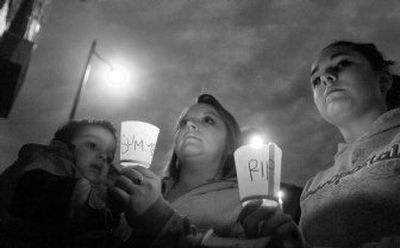Death draws dozens to vigil

With candlelight, poetry, words of remembrance and tears, they honored the life of a girl they never knew – a child stashed away from the world, hidden in a third-floor apartment, where she was abused until she died.
The death of 4-year-old Summer Phelps continues to hang heavy on people’s minds. On Saturday, dozens gathered in her name outside the Dresden Apartments, where she suffered during the last months of her short life.
“How can something so horrible happen to someone so precious?” asked Stacy Buckelew, of Spokane, who attended the candlelight vigil with her 2-year-old son, Joseph.
Summer Phelps died a week ago after her father rushed her to the emergency room at Deaconess Medical Center. Her dad, Jonathan Lytle, 28, and stepmother, Adriana Lytle, 32, now face several charges, including homicide by abuse.
The vigil, which drew people from throughout Spokane and Coeur d’Alene, was organized by Kent Lewis, a resident of the Dresden, located at 707 N. Monroe St.
Lewis, who moved into a second-floor apartment three weeks ago, never knew the Lytles. He never even realized that there were children living upstairs. But when he read about what happened to the little girl, he wanted people to come together and honor her memory. So he called chaplains, the media, churches and other organizations.
“I just want peace for little Summer,” said Lewis, a tall, bearded man with a black cane in his hands and a white dove on his shoulder.
On the sidewalk near the corner of Monroe Street and College Avenue, he and others built a makeshift memorial out of votive candles, a small blue balloon and bouquets of carnations. Jennifer Sanford – one of the emergency room nurses who cared for Summer the night she died – and two of her friends passed out small pinwheels, a national symbol to highlight the need for child abuse prevention. Each pinwheel came with a piece of paper that displayed a picture of the little red-haired girl, a psalm and the words, “In Memory of Summer Phelps, and all victims of child abuse.”
“It’s a terrible, tragic thing,” said Amy Nap, one of the women who brought the pinwheels. “How anyone can harm a child is beyond words. … It’s not just about Summer, but about all the abuse that goes on around us.”
Since the little girl’s death, Lewis has started walking the halls of the Dresden, where only about 20 of the 30 apartments are occupied. Whenever he hears something suspicious, he immediately steps out to see what’s going on. “People need to keep their eye out for trouble,” he said.
Misty Thelin, of Coeur d’Alene, urged the crowd to take action and notify authorities whenever they suspect abuse. “It can save a child’s life,” she said.
Thelin also evoked the names of other children and youths who have died in recent years including Carissa Benway, a 14-year-old from Post Falls who was raped and murdered in 2000. Thelin, who babysat Carissa when she was 2 years old, named her own daughter after the murdered girl. Since Carissa’s death, Thelin has made it her mission to speak out against anyone who harms a child.
“I want to know why it keeps happening here,” said an emotional Thelin. “I want it to stop. … People from all over the world are now grieving for Summer. She will always live in our minds and hearts.”